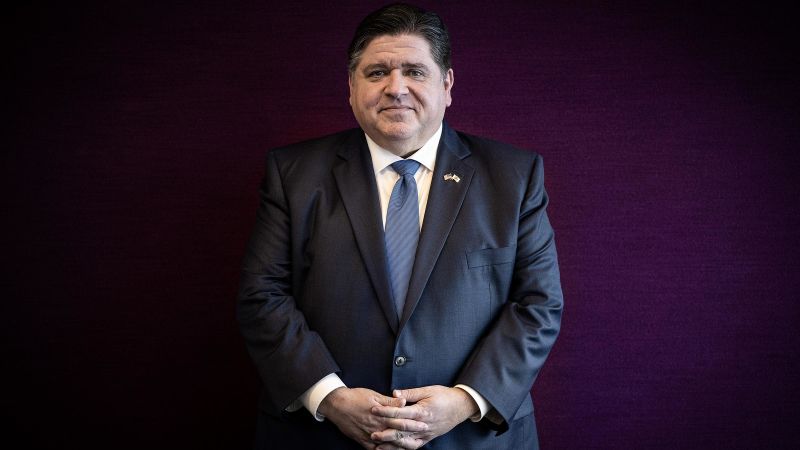Illinois Governor JB Pritzker recently engaged in a humorous yet poignant conversation with New Hampshire Congresswoman Maggie Goodlander. The light-hearted exchange quickly morphed into a deeper discussion, highlighting the challenges faced by both politicians in their respective arenas. Goodlander expressed her frustrations about the political landscape, joking about the first months of her congressional term being “awful,” a sentiment Pritzker mirrored with a sardonic laugh. The dialogue soon escalated into a serious huddle, touching on their shared experiences with colleagues and their own battles with the demands posed by former President Donald Trump. This encounter set the tone for Pritzker’s trip to New Hampshire, traditionally a launching pad for presidential aspirations.
Pritzker has recently projected a sense of urgency regarding the political climate. He conveyed to CNN that a growing number of politicians are beginning to recognize the necessity of taking a stand against rising authoritarianism. “I don’t care why you’re joining the fight at this point,” he asserted, stressing the importance of collective action against common threats. As he articulated his sentiments, he instigated a broader reflection among Democratic affiliates, questioning how they would be remembered by history. This marked a bold public stance, underscoring Pritzker’s readiness to assume a leadership role, potentially signaling his ambitions for the presidential race in 2028. Throughout his speeches, he has drawn sharp contrasts between the Democratic values he champions and what he terms the “tyrants and traitors” of the Republican Party.
Pritzker’s recent visit to New Hampshire was decidedly overt in its motivation, aimed not just at fostering conversation but also crafting a narrative around his political future. His speeches, peppered with alarming analogies likening Trump’s political maneuvers to the rise of the Nazis, are not merely alarmist rhetoric but part of a strategy to galvanize his party base while keeping his name in contention for higher office. Pritzker’s robust engagement in party politics, along with his public declarations, illustrates his keen insights into the current political landscape, as he urges his fellow Democrats to face their challenges head-on rather than retreat into complacency.
As a veteran donor to the Democratic Party before stepping into his role as governor, Pritzker occupies a distinctive position in the political arena. His financial background, stemming from a successful lineage in the Hyatt hotel empire, has positioned him as a formidable player within the party. Should he choose to run for president in the coming years, he is expected to leverage his wealth significantly, much like he has done in funding his gubernatorial campaigns. Notably, his willingness to sternly question other Democratic leaders about their efforts reflects a blend of ambition and accountability that resonates with party activists.
His responsibilities extend beyond state boundaries, often involving calls to political figures across the country to strategize collaborative efforts against Trump’s maneuvers. For instance, after President Biden’s administration faced potential funding cuts that would impact Maine, Pritzker proactively reached out to support Maine Governor Janet Mills. This cross-state solidarity showcases Pritzker’s commitment not only to Illinois but to the collective welfare of Democratic governors facing heightened challenges.
While Pritzker’s approach garners both admiration and critique, some perceive his actions as a safe play for a politician shielded by his wealth and status. Others have suggested that his financial clout allows him to launch initiatives with minimal scrutiny, giving rise to an image of an “oligarch” in a party seeking authenticity. However, Pritzker addresses these concerns with a considered response, recognizing that within the party’s current environment, skepticism towards wealth is understandable yet not necessarily reflective of his values or intentions.
As he continues to engage with constituents, Pritzker seems aware of the balancing act he must perform: to be both relatable and resolutely ambitious. He actively participates in grassroots initiatives and emphasizes a desire to be seen as an approachable figure, as evidenced by his frequent interactions that humanize his political persona. His familial ethos, shaped by his great-grandfather’s narrative of overcoming adversity, also weaves into his political ideology, emphasizing integrity and responsibility as core values.
In conclusion, Pritzker’s moment in the limelight at recent political events has sparked curiosity among Democratic operatives and voters alike. With 2028 looming, his strategic positioning signals a readiness to potentially move from local governance to a national platform. The landscape ahead is rich with possibility, but Pritzker’s ability to navigate both the political charged environment and the concerns of voters will be crucial to his ambitions. The resonance of his message among party loyalists, as experienced in New Hampshire, suggests that he is successfully cultivating a narrative of engagement and leadership that may well serve him in the years to come.



